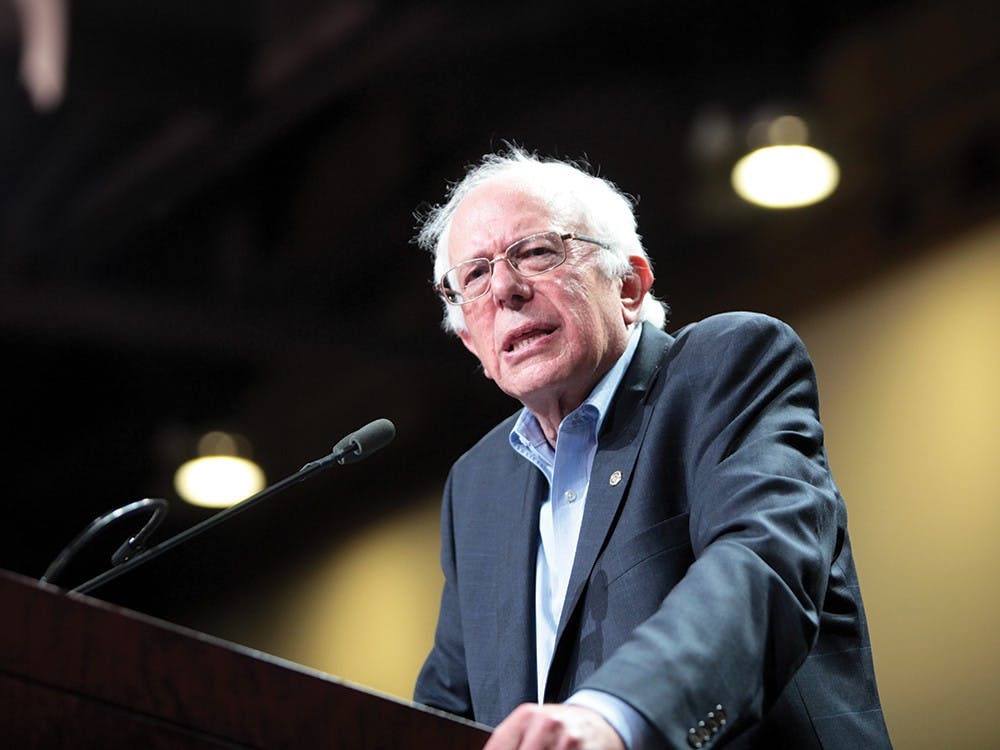Of likely registered voters on Grounds, 67 percent will vote for Clinton, while 9 percent will vote for Trump in a four-way race, according to a recent poll conducted by The Cavalier Daily in partnership with a faculty advisory committee and the Center for Survey Research.
These trends show significantly increased support for the two major candidates when compared to primary election results.
The survey asked students which candidate they most strongly supported in the primary elections, even if they did not actually vote for that candidate. For the Democratic primary, approximately 64 percent of respondents supported Sen. Bernie Sanders (I-VT), while just 33 percent supported Clinton. Less than 2 percent supported Maryland Gov. Martin O’Malley or another candidate.
Ryan Heilman, a first-year College student and survey respondent, said he is a left-leaning moderate who voted for Sanders in the primaries but will not vote for either main candidate in the election. As of last week, Heilman was undecided.
“The choice to vote how I did in the primaries was basically based on where I thought my vote would have the largest impact,” Heliman said. “So there were some candidates on the Republican side but they were so low down in the polls that I felt that my vote wouldn’t really have a chance at winning any of the electoral votes allotted to my state so I went with the vote for Sanders.”
For the Republican primary, the most popular candidate by far among students was Sen. Marco Rubio (R-FL) who earned approximately 47 percent of the student vote, with Gov. John Kasich (R-OH) earning about 25 percent. Support for all other Republican candidates was in the single digits, including support for Trump, which was about 7.5 percent of the likely registered voters who supported a candidate in the Republican primary.
Though Rubio gained the most Univeristy student support in the primary election, not all students who voted for him intended to vote for him in the general election.
Amalia Garcia-Pretelt, a second-year College student who responded to The Cavalier Daily’s survey, said she voted for Rubio in the primaries but always planned to vote for Clinton in the general election.
“I voted in the Republican primary because I figured Hillary would probably win Virginia anyway in the primary, so then I just voted in the Republican primary basically as a way to vote for anyone who wasn’t Trump,” Garcia-Pretelt said.
Sen. Ted Cruz (R-TX) earned approximately 6.5 percent of the student vote, former Florida Gov. Jeb Bush got 4.7 percent, Sen. Rand Paul (R-KY) got 3.8 percent and Carly Fiorina got 1.2 percent. All other candidates earned less than 1 percent of the vote in the primary. In contrast, Trump and Clinton won Virginia in both parties’ primary elections.
Support for Trump amongst University students also increased in the time between the primary and general elections.
Tanner Hirschfeld, a first-year College student who took the survey, said he voted for Ben Carson in the primary but voted early for Trump in the general election. He originally planned to support Libertarian candidate Gary Johnson, but said he ultimately felt that he had to choose between the two major parties’ candidates in this election.
“I supported Ben Carson in the primary because I believe in a candidate who is going to stand for what he says, a candidate with integrity and a candidate who’s been proven in his field of work,” Hirschfeld said.
Though Hirschfeld said he disapproved of several messages and the rhetoric used in Trump’s campaign, he said his choice was less about what Trump has said and more about what Hirschfeld believes Trump will do.
“I cast my vote for Trump because I’m worried about who’s going to be our Supreme Court nominee, because it lasts much longer than any sort of presidency would last,” Hirschfeld said. “I simply could not cast a ballot for Hillary Clinton or any vote that would lead to her election by taking a vote away from the Republican party. We’ve seen the emails, we’ve seen the repercussions of her national security and foreign policy decisions, and they scare me.”
While Hirschfeld is standing by the Republican party, Sam Kraus, a fourth-year College student who took the survey, voted in the Republican primary but will not be voting for Trump in the general election.
“I voted in the Republican primary because I generally agree with most conservative ideals, and I wanted to cast my vote within the party that I most closely identified. However, through the last year I have been increasingly disappointed with the Republican Party,” Kraus said in an email statement. “At this point, I refuse to vote for Trump for president, but do intend on voting for conservatives further down the ballot.”
Kraus is still undecided, but said he also will not vote for Johnson. He said he will either vote for Clinton, although he does not support her, or another candidate.
“Recent reports actually show Virginia as more confidently blue, so I think I may end up voting McMullin on Tuesday and vote my conscience like multiple prominent anti-Trump conservatives have recommended through this election season,” Kraus said.
Despite the several concerns that students share over the election, Hirschfeld expressed his hope that either candidate will be supported, if elected.
“When it comes down to it, we’re all Americans and I hope we can put that first,” Hirschfeld said.
For more information on polling methodology, click here.







